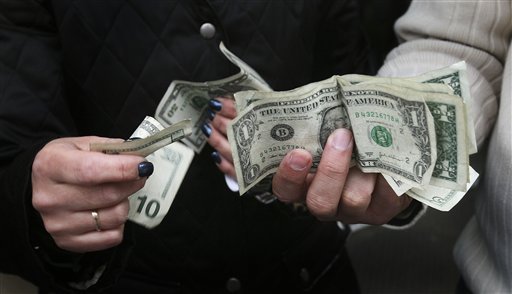Wall Street took a dose of bad economic news with relative calm
Tuesday, rallying sharply even as consumer confidence plunged to
its lowest levels in 41 years.
TIM PARADIS – Associated Press
NEW YORK
Wall Street took a dose of bad economic news with relative calm Tuesday, rallying sharply even as consumer confidence plunged to its lowest levels in 41 years. The Dow Jones industrial average rose nearly 270 points, leading the major indexes with a gain of more than 2 percent.
The market did fluctuate after the Conference Board said its index of consumer confidence has fallen to 38 in October, well below the 51 analysts expected. Wall Street is worried that consumers, whose spending drives more than two-thirds of economic growth, will keep pulling back, particularly as the holiday shopping season approaches – but with a litany of bad economic news this month, many investors expected the index to sag.
“The market already reflects a very, very poor outlook. That said, these numbers are coming in way lower than expected,” said Jack Ablin, chief investment officer at Harris Private Bank in Chicago. “Consumer confidence is a pretty good predictor of retail sales.”
But investors were combing the market for beaten-down stocks after the Dow fell more than 500 over two sessions. They were also trying to position themselves ahead of the Federal Reserve’s next move on interest rates, which is expected Wednesday.
But by holding on to most of its gains, the market seemed to be coming to terms with the fact that bad economic news will continue to stream in. Indeed, other casualties from the global credit crisis piled up Tuesday: Whirlpool Corp. said it will cut about 5,000 jobs by the end of 2009, Iceland said it needs $6 billion and Germany said Pakistan must secure a loan from the International Monetary Fund within a week.
In early afternoon trading, the Dow rose 267.38, or 3.27 percent, to 8,443.15 in volatile trading that saw the Dow rise nearly 331 points in the early going. The big moves weren’t a surprise, given the huge swings stocks have shown in the past six weeks since the bankruptcy filing of Lehman Brothers Holdings Inc. Only two of the 19 trading days in October haven’t ended with the Dow up or down by triple digits.
Broader stock indicators also advanced. The Standard & Poor’s 500 index rose 23.91, or 2.82 percent, to 872.83, and the Nasdaq composite index rose 33.81, or 2.25 percent, to 1,539.71.
The Russell 2000 index of smaller companies rose 2.92, or 0.65 percent, to 451.32.
Declining issues outnumbered advancers by about 3 to 2 on the New York Stock Exchange, where volume came to 678.4 million shares.
Bond prices were mixed as some investors looked for the safety of government debt. The yield on the three-month Treasury bill, regarded as the safest investment around and an indicator of investor sentiment, fell to 0.75 percent from 0.77 percent Monday. The lower yield indicates an increase in demand. Meanwhile, the yield on the benchmark 10-year Treasury note rose to 3.80 percent from 3.69 percent late Monday.
The dollar was mixed against other major currencies, while gold prices fell.
Light, sweet crude fell 3 cents to $63.19 a barrel on the New York Mercantile Exchange.
Investors worldwide snapped up stocks after posting huge declines Monday on economic worries. Japan’s Nikkei stock average jumped 6.41 percent and Hong Kong’s Hang Seng index surged 14.4 percent – its biggest gain in 11 years – a day after plunging more than 12 percent. Britain’s FTSE 100 rose 2.61 percent, Germany’s DAX index jumped 11.28 percent, and France’s CAC-40 rose 1.38 percent.
The disruptions in the normal flow of the credit markets over the past six weeks have produced widespread worries about the economy’s ability to avoid a severe downturn. The evaporation in lending is making it difficult and more expensive for businesses and consumers to get loans.
But Monday saw the start of the Fed’s efforts to revive lending in the commercial paper market, where companies turn for short-term loans. General Electric Co., for example, has said it would borrow money from the government. The Treasury has also begun to implement part of the government’s $700 billion financial bailout plan by investing directly in some banks to give them a much-need source of fresh cash.
The government’s extraordinary moves to help support borrowing and restore market confidence come as unease about the economy has buffeted trading. Some of Wall Street’s gyrations since the mid-September bankruptcy filing of Lehman Brothers Holdings Inc. and the subsequent seizing up of the credit markets are tied to massive selling by hedge funds and mutual funds trying to raise cash for nervous investors.
Charlie Smith, chief investment officer at Fort Pitt Capital Group in Pittsburgh, said consumers are seeing the turmoil on Wall Street and curbing their spending while they wait to try to determine how far the market might fall and the depth of the economy’s troubles.
“We’ve got obviously a very fragile psyche. And the consumer confidence number basically confirmed that,” he said. “People are waiting for the next shoe to drop in terms of the financial debacle.”
Smith also noted that forced selling by funds is adding to the market’s difficulty.
“You have a tug of war between the folks who believe there is a fundamental value in the market and that we aren’t going into the abyss and the people who are being forced to sell because of margin calls,” he said.
In a margin call, a broker who lent money to an investor calls in the loan, forcing the investor to sell stock to repay the loan.
In corporate news, Whirlpool fell $6.52, or 13 percent, to $43.51 after lowering its earnings forecast for the year. The nation’s largest home appliance maker, which also announced plans to cut about 5,000 jobs by the end of 2009, cited tightness in the credit markets and predicted demand will continue to slide in North America and Europe.
Boeing Co. rose $2.46, or 5.8 percent, to $44.82 after the company and its striking machinists’ union hammered out a tentative four-year labor deal that could end a 53-day walkout that has idled factories and delayed jet deliveries.
The reports came as fallout from credit market troubles popped up around the globe. Iceland’s central bank on Tuesday raised its key interest rate by an enormous 6 percentage points to 18 percent. Iceland has seen its currency tumble after its banking sector collapsed this month. Prime minister Geir Haarde said separately on Tuesday that the country will require $4 billion in financial support in addition to the $2 billion loan package announced by the IMF.
Meanwhile, Germany’s foreign minister said Tuesday that Pakistan must secure a loan from the IMF within a week to avoid sliding into a financial crisis.














